Report on the Contemporary Hospitality Industry: Unit 1 Analysis
VerifiedAdded on 2020/10/23
|9
|2504
|414
Report
AI Summary
This report provides a comprehensive analysis of the contemporary hospitality industry in the UK. It begins by examining the industry's scale, scope, and diversity, including the number of businesses, types of ownership, and its contribution to the UK economy. The report then delves into the organizational structures of different hospitality businesses, using examples like Hilton International Hotel, Alton Towers, and PenniBlack. It discusses the roles, responsibilities, and qualification requirements for various hospitality staff positions, such as managers, supervisors, and front desk officers. Furthermore, the report assesses the role of hospitality-related organizations and professional bodies like the British Hospitality Association, People 1st, Springboard UK, and the British Institute of Innkeepers. The report also analyzes the staffing requirements of different hospitality businesses. The report includes an analysis of the selected operator’s turnover, type of products and services it provides, its history and development within the hospitality industry and evaluates the extent to which the scale and scope of hospitality businesses affects the diversity of products and services offered.
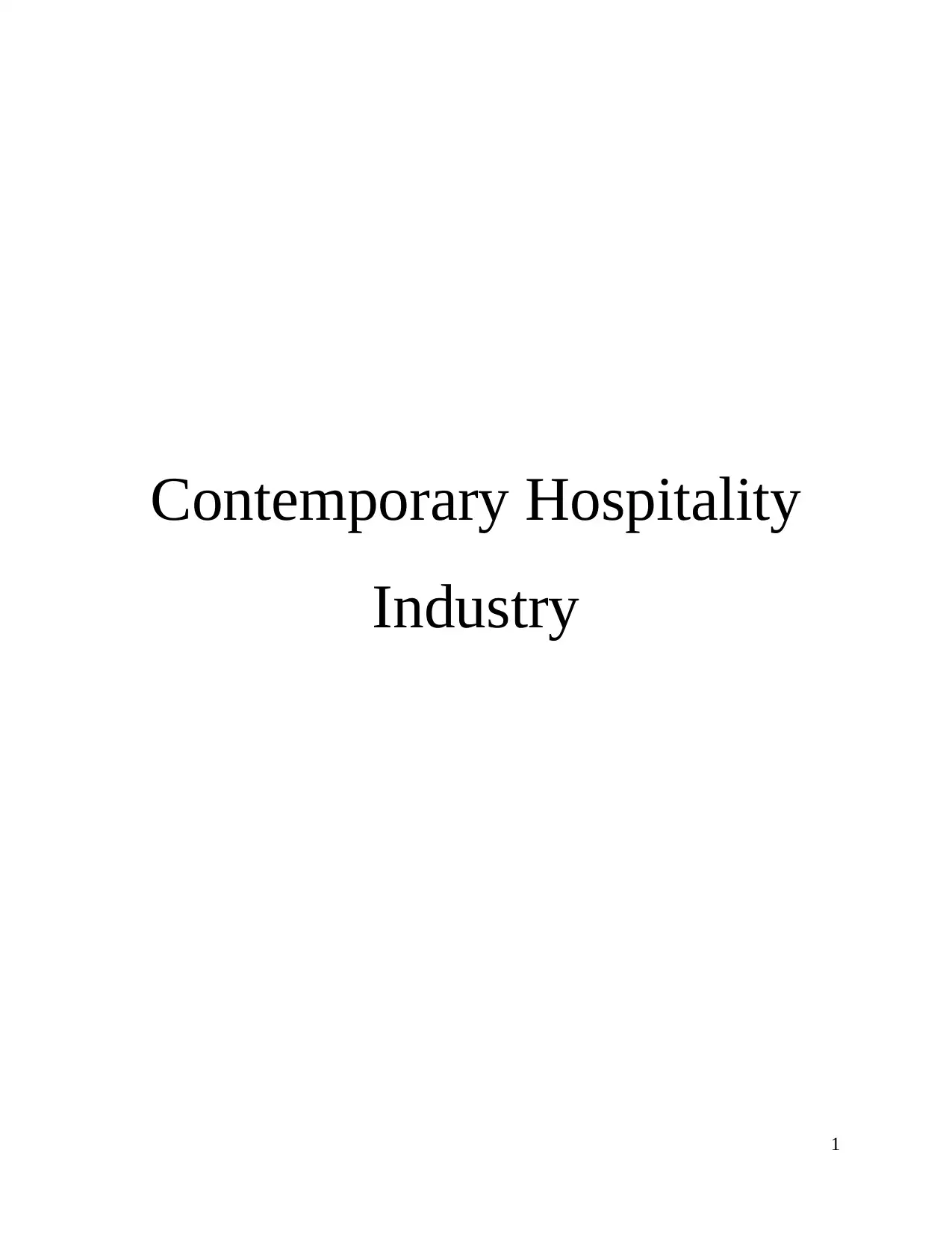
Contemporary Hospitality
Industry
1
Industry
1
Paraphrase This Document
Need a fresh take? Get an instant paraphrase of this document with our AI Paraphraser
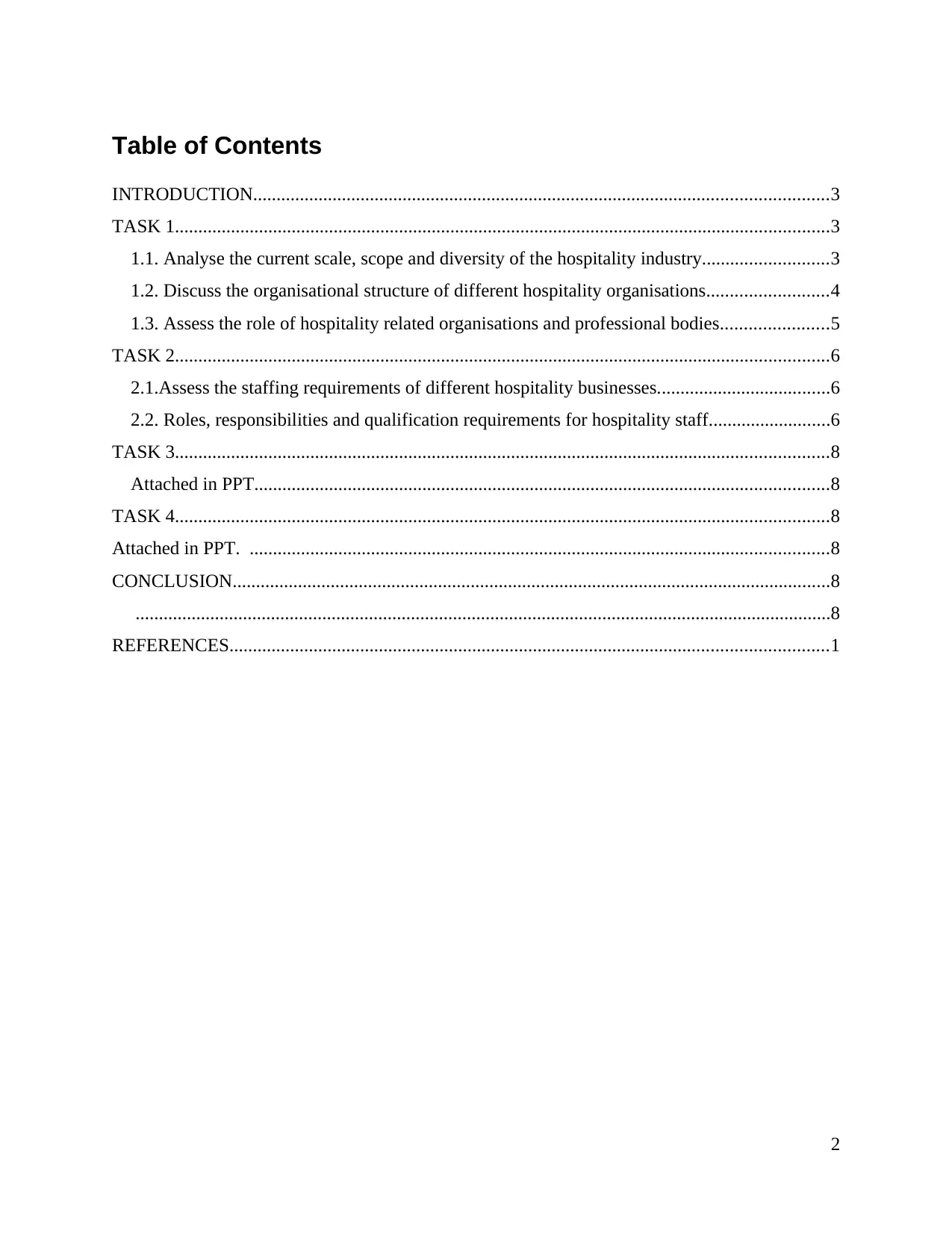
Table of Contents
INTRODUCTION...........................................................................................................................3
TASK 1............................................................................................................................................3
1.1. Analyse the current scale, scope and diversity of the hospitality industry...........................3
1.2. Discuss the organisational structure of different hospitality organisations..........................4
1.3. Assess the role of hospitality related organisations and professional bodies.......................5
TASK 2............................................................................................................................................6
2.1.Assess the staffing requirements of different hospitality businesses.....................................6
2.2. Roles, responsibilities and qualification requirements for hospitality staff..........................6
TASK 3............................................................................................................................................8
Attached in PPT...........................................................................................................................8
TASK 4............................................................................................................................................8
Attached in PPT. ............................................................................................................................8
CONCLUSION................................................................................................................................8
.....................................................................................................................................................8
REFERENCES................................................................................................................................1
2
INTRODUCTION...........................................................................................................................3
TASK 1............................................................................................................................................3
1.1. Analyse the current scale, scope and diversity of the hospitality industry...........................3
1.2. Discuss the organisational structure of different hospitality organisations..........................4
1.3. Assess the role of hospitality related organisations and professional bodies.......................5
TASK 2............................................................................................................................................6
2.1.Assess the staffing requirements of different hospitality businesses.....................................6
2.2. Roles, responsibilities and qualification requirements for hospitality staff..........................6
TASK 3............................................................................................................................................8
Attached in PPT...........................................................................................................................8
TASK 4............................................................................................................................................8
Attached in PPT. ............................................................................................................................8
CONCLUSION................................................................................................................................8
.....................................................................................................................................................8
REFERENCES................................................................................................................................1
2
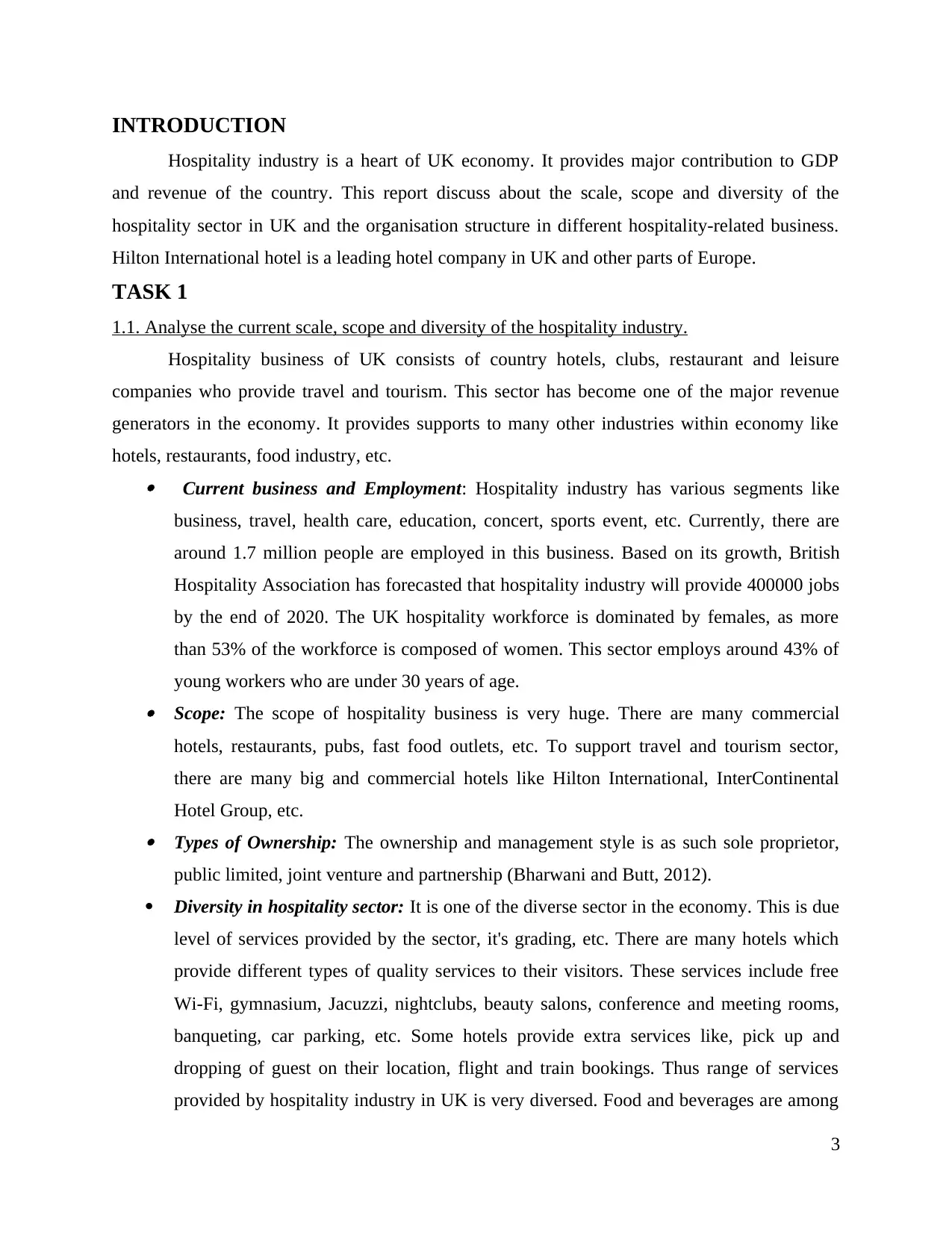
INTRODUCTION
Hospitality industry is a heart of UK economy. It provides major contribution to GDP
and revenue of the country. This report discuss about the scale, scope and diversity of the
hospitality sector in UK and the organisation structure in different hospitality-related business.
Hilton International hotel is a leading hotel company in UK and other parts of Europe.
TASK 1
1.1. Analyse the current scale, scope and diversity of the hospitality industry.
Hospitality business of UK consists of country hotels, clubs, restaurant and leisure
companies who provide travel and tourism. This sector has become one of the major revenue
generators in the economy. It provides supports to many other industries within economy like
hotels, restaurants, food industry, etc. Current business and Employment: Hospitality industry has various segments like
business, travel, health care, education, concert, sports event, etc. Currently, there are
around 1.7 million people are employed in this business. Based on its growth, British
Hospitality Association has forecasted that hospitality industry will provide 400000 jobs
by the end of 2020. The UK hospitality workforce is dominated by females, as more
than 53% of the workforce is composed of women. This sector employs around 43% of
young workers who are under 30 years of age. Scope: The scope of hospitality business is very huge. There are many commercial
hotels, restaurants, pubs, fast food outlets, etc. To support travel and tourism sector,
there are many big and commercial hotels like Hilton International, InterContinental
Hotel Group, etc. Types of Ownership: The ownership and management style is as such sole proprietor,
public limited, joint venture and partnership (Bharwani and Butt, 2012).
Diversity in hospitality sector: It is one of the diverse sector in the economy. This is due
level of services provided by the sector, it's grading, etc. There are many hotels which
provide different types of quality services to their visitors. These services include free
Wi-Fi, gymnasium, Jacuzzi, nightclubs, beauty salons, conference and meeting rooms,
banqueting, car parking, etc. Some hotels provide extra services like, pick up and
dropping of guest on their location, flight and train bookings. Thus range of services
provided by hospitality industry in UK is very diversed. Food and beverages are among
3
Hospitality industry is a heart of UK economy. It provides major contribution to GDP
and revenue of the country. This report discuss about the scale, scope and diversity of the
hospitality sector in UK and the organisation structure in different hospitality-related business.
Hilton International hotel is a leading hotel company in UK and other parts of Europe.
TASK 1
1.1. Analyse the current scale, scope and diversity of the hospitality industry.
Hospitality business of UK consists of country hotels, clubs, restaurant and leisure
companies who provide travel and tourism. This sector has become one of the major revenue
generators in the economy. It provides supports to many other industries within economy like
hotels, restaurants, food industry, etc. Current business and Employment: Hospitality industry has various segments like
business, travel, health care, education, concert, sports event, etc. Currently, there are
around 1.7 million people are employed in this business. Based on its growth, British
Hospitality Association has forecasted that hospitality industry will provide 400000 jobs
by the end of 2020. The UK hospitality workforce is dominated by females, as more
than 53% of the workforce is composed of women. This sector employs around 43% of
young workers who are under 30 years of age. Scope: The scope of hospitality business is very huge. There are many commercial
hotels, restaurants, pubs, fast food outlets, etc. To support travel and tourism sector,
there are many big and commercial hotels like Hilton International, InterContinental
Hotel Group, etc. Types of Ownership: The ownership and management style is as such sole proprietor,
public limited, joint venture and partnership (Bharwani and Butt, 2012).
Diversity in hospitality sector: It is one of the diverse sector in the economy. This is due
level of services provided by the sector, it's grading, etc. There are many hotels which
provide different types of quality services to their visitors. These services include free
Wi-Fi, gymnasium, Jacuzzi, nightclubs, beauty salons, conference and meeting rooms,
banqueting, car parking, etc. Some hotels provide extra services like, pick up and
dropping of guest on their location, flight and train bookings. Thus range of services
provided by hospitality industry in UK is very diversed. Food and beverages are among
3
⊘ This is a preview!⊘
Do you want full access?
Subscribe today to unlock all pages.

Trusted by 1+ million students worldwide
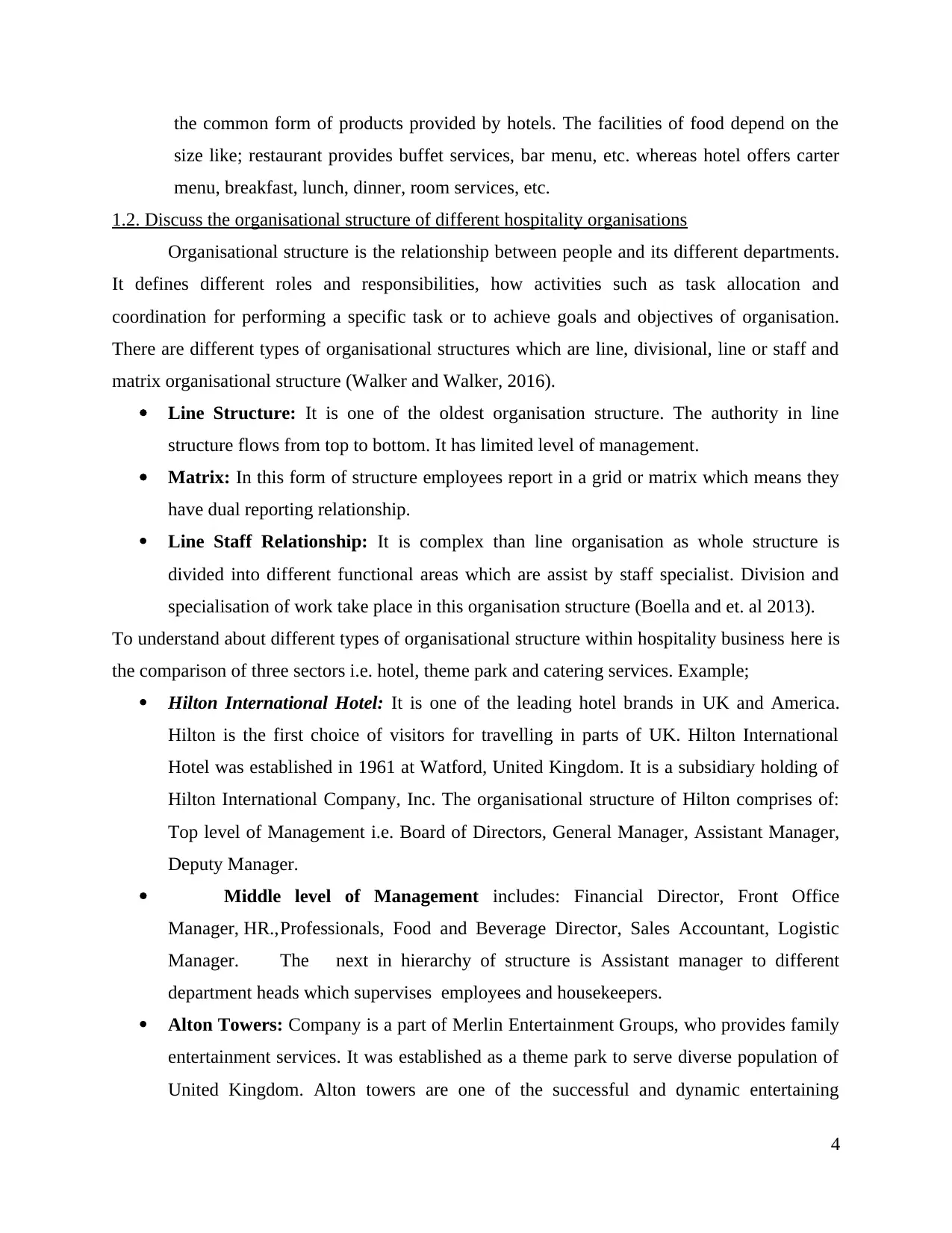
the common form of products provided by hotels. The facilities of food depend on the
size like; restaurant provides buffet services, bar menu, etc. whereas hotel offers carter
menu, breakfast, lunch, dinner, room services, etc.
1.2. Discuss the organisational structure of different hospitality organisations
Organisational structure is the relationship between people and its different departments.
It defines different roles and responsibilities, how activities such as task allocation and
coordination for performing a specific task or to achieve goals and objectives of organisation.
There are different types of organisational structures which are line, divisional, line or staff and
matrix organisational structure (Walker and Walker, 2016).
Line Structure: It is one of the oldest organisation structure. The authority in line
structure flows from top to bottom. It has limited level of management.
Matrix: In this form of structure employees report in a grid or matrix which means they
have dual reporting relationship.
Line Staff Relationship: It is complex than line organisation as whole structure is
divided into different functional areas which are assist by staff specialist. Division and
specialisation of work take place in this organisation structure (Boella and et. al 2013).
To understand about different types of organisational structure within hospitality business here is
the comparison of three sectors i.e. hotel, theme park and catering services. Example;
Hilton International Hotel: It is one of the leading hotel brands in UK and America.
Hilton is the first choice of visitors for travelling in parts of UK. Hilton International
Hotel was established in 1961 at Watford, United Kingdom. It is a subsidiary holding of
Hilton International Company, Inc. The organisational structure of Hilton comprises of:
Top level of Management i.e. Board of Directors, General Manager, Assistant Manager,
Deputy Manager.
Middle level of Management includes: Financial Director, Front Office
Manager, HR.,Professionals, Food and Beverage Director, Sales Accountant, Logistic
Manager. The next in hierarchy of structure is Assistant manager to different
department heads which supervises employees and housekeepers.
Alton Towers: Company is a part of Merlin Entertainment Groups, who provides family
entertainment services. It was established as a theme park to serve diverse population of
United Kingdom. Alton towers are one of the successful and dynamic entertaining
4
size like; restaurant provides buffet services, bar menu, etc. whereas hotel offers carter
menu, breakfast, lunch, dinner, room services, etc.
1.2. Discuss the organisational structure of different hospitality organisations
Organisational structure is the relationship between people and its different departments.
It defines different roles and responsibilities, how activities such as task allocation and
coordination for performing a specific task or to achieve goals and objectives of organisation.
There are different types of organisational structures which are line, divisional, line or staff and
matrix organisational structure (Walker and Walker, 2016).
Line Structure: It is one of the oldest organisation structure. The authority in line
structure flows from top to bottom. It has limited level of management.
Matrix: In this form of structure employees report in a grid or matrix which means they
have dual reporting relationship.
Line Staff Relationship: It is complex than line organisation as whole structure is
divided into different functional areas which are assist by staff specialist. Division and
specialisation of work take place in this organisation structure (Boella and et. al 2013).
To understand about different types of organisational structure within hospitality business here is
the comparison of three sectors i.e. hotel, theme park and catering services. Example;
Hilton International Hotel: It is one of the leading hotel brands in UK and America.
Hilton is the first choice of visitors for travelling in parts of UK. Hilton International
Hotel was established in 1961 at Watford, United Kingdom. It is a subsidiary holding of
Hilton International Company, Inc. The organisational structure of Hilton comprises of:
Top level of Management i.e. Board of Directors, General Manager, Assistant Manager,
Deputy Manager.
Middle level of Management includes: Financial Director, Front Office
Manager, HR.,Professionals, Food and Beverage Director, Sales Accountant, Logistic
Manager. The next in hierarchy of structure is Assistant manager to different
department heads which supervises employees and housekeepers.
Alton Towers: Company is a part of Merlin Entertainment Groups, who provides family
entertainment services. It was established as a theme park to serve diverse population of
United Kingdom. Alton towers are one of the successful and dynamic entertaining
4
Paraphrase This Document
Need a fresh take? Get an instant paraphrase of this document with our AI Paraphraser
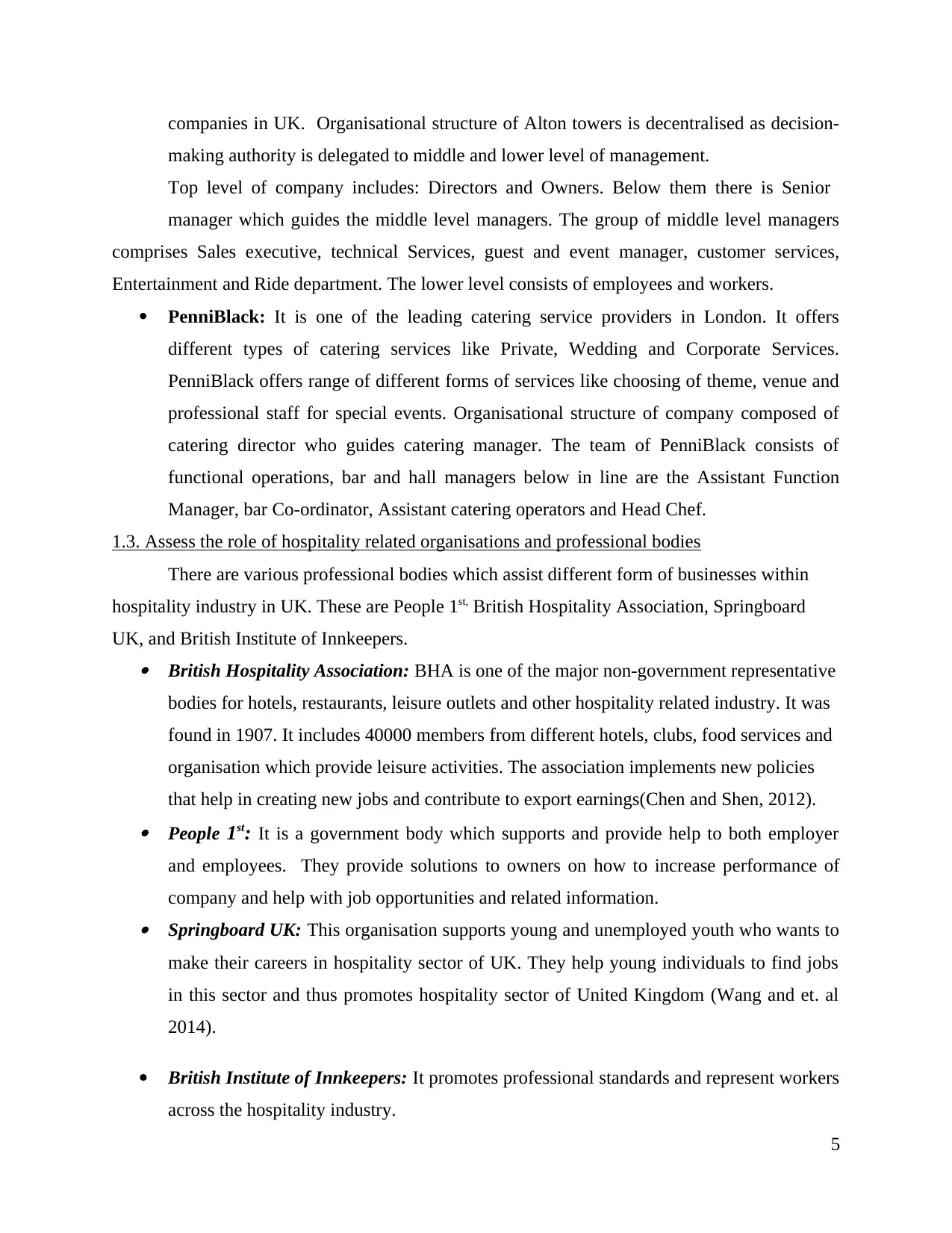
companies in UK. Organisational structure of Alton towers is decentralised as decision-
making authority is delegated to middle and lower level of management.
Top level of company includes: Directors and Owners. Below them there is Senior
manager which guides the middle level managers. The group of middle level managers
comprises Sales executive, technical Services, guest and event manager, customer services,
Entertainment and Ride department. The lower level consists of employees and workers.
PenniBlack: It is one of the leading catering service providers in London. It offers
different types of catering services like Private, Wedding and Corporate Services.
PenniBlack offers range of different forms of services like choosing of theme, venue and
professional staff for special events. Organisational structure of company composed of
catering director who guides catering manager. The team of PenniBlack consists of
functional operations, bar and hall managers below in line are the Assistant Function
Manager, bar Co-ordinator, Assistant catering operators and Head Chef.
1.3. Assess the role of hospitality related organisations and professional bodies
There are various professional bodies which assist different form of businesses within
hospitality industry in UK. These are People 1st, British Hospitality Association, Springboard
UK, and British Institute of Innkeepers. British Hospitality Association: BHA is one of the major non-government representative
bodies for hotels, restaurants, leisure outlets and other hospitality related industry. It was
found in 1907. It includes 40000 members from different hotels, clubs, food services and
organisation which provide leisure activities. The association implements new policies
that help in creating new jobs and contribute to export earnings(Chen and Shen, 2012). People 1st: It is a government body which supports and provide help to both employer
and employees. They provide solutions to owners on how to increase performance of
company and help with job opportunities and related information. Springboard UK: This organisation supports young and unemployed youth who wants to
make their careers in hospitality sector of UK. They help young individuals to find jobs
in this sector and thus promotes hospitality sector of United Kingdom (Wang and et. al
2014).
British Institute of Innkeepers: It promotes professional standards and represent workers
across the hospitality industry.
5
making authority is delegated to middle and lower level of management.
Top level of company includes: Directors and Owners. Below them there is Senior
manager which guides the middle level managers. The group of middle level managers
comprises Sales executive, technical Services, guest and event manager, customer services,
Entertainment and Ride department. The lower level consists of employees and workers.
PenniBlack: It is one of the leading catering service providers in London. It offers
different types of catering services like Private, Wedding and Corporate Services.
PenniBlack offers range of different forms of services like choosing of theme, venue and
professional staff for special events. Organisational structure of company composed of
catering director who guides catering manager. The team of PenniBlack consists of
functional operations, bar and hall managers below in line are the Assistant Function
Manager, bar Co-ordinator, Assistant catering operators and Head Chef.
1.3. Assess the role of hospitality related organisations and professional bodies
There are various professional bodies which assist different form of businesses within
hospitality industry in UK. These are People 1st, British Hospitality Association, Springboard
UK, and British Institute of Innkeepers. British Hospitality Association: BHA is one of the major non-government representative
bodies for hotels, restaurants, leisure outlets and other hospitality related industry. It was
found in 1907. It includes 40000 members from different hotels, clubs, food services and
organisation which provide leisure activities. The association implements new policies
that help in creating new jobs and contribute to export earnings(Chen and Shen, 2012). People 1st: It is a government body which supports and provide help to both employer
and employees. They provide solutions to owners on how to increase performance of
company and help with job opportunities and related information. Springboard UK: This organisation supports young and unemployed youth who wants to
make their careers in hospitality sector of UK. They help young individuals to find jobs
in this sector and thus promotes hospitality sector of United Kingdom (Wang and et. al
2014).
British Institute of Innkeepers: It promotes professional standards and represent workers
across the hospitality industry.
5
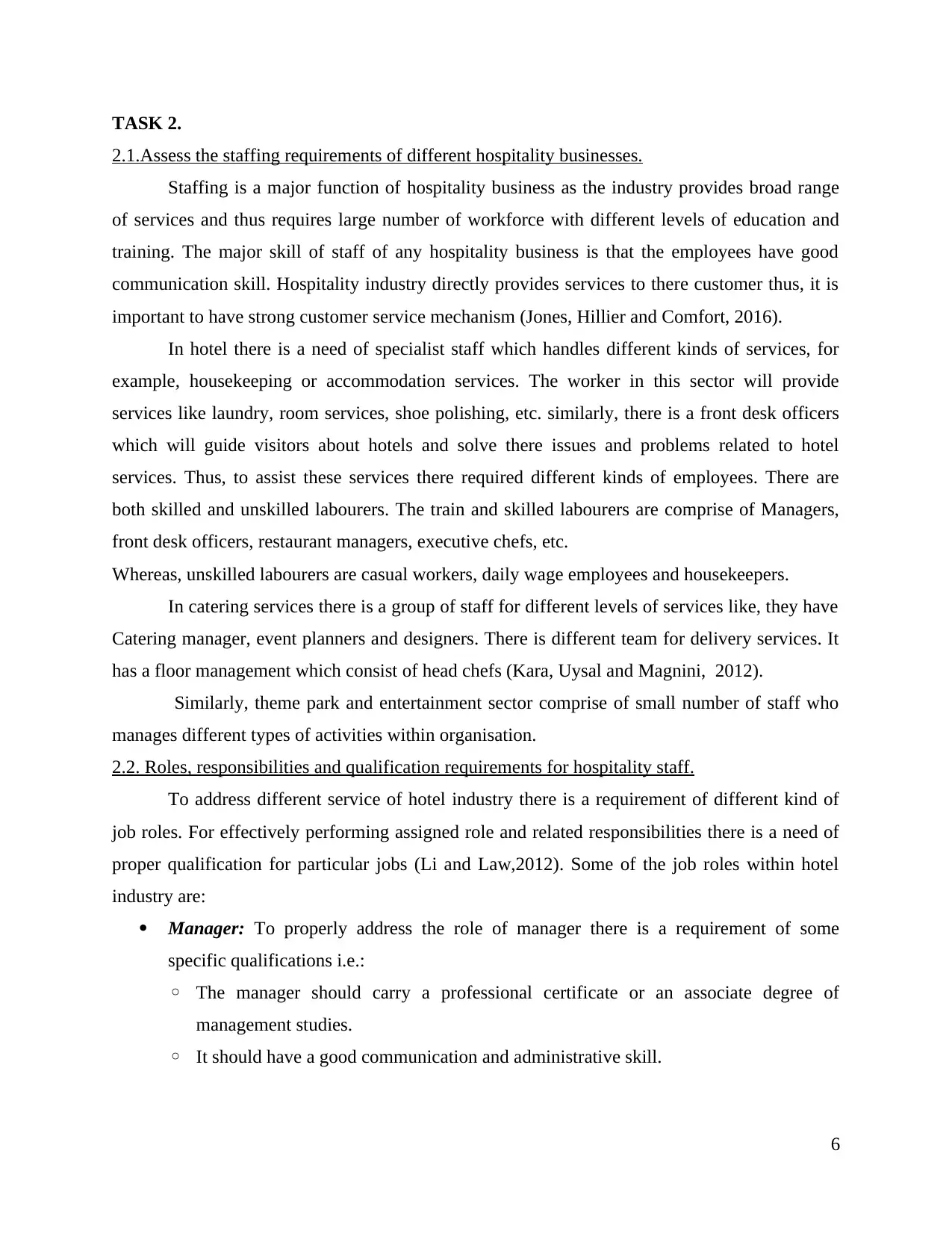
TASK 2.
2.1.Assess the staffing requirements of different hospitality businesses.
Staffing is a major function of hospitality business as the industry provides broad range
of services and thus requires large number of workforce with different levels of education and
training. The major skill of staff of any hospitality business is that the employees have good
communication skill. Hospitality industry directly provides services to there customer thus, it is
important to have strong customer service mechanism (Jones, Hillier and Comfort, 2016).
In hotel there is a need of specialist staff which handles different kinds of services, for
example, housekeeping or accommodation services. The worker in this sector will provide
services like laundry, room services, shoe polishing, etc. similarly, there is a front desk officers
which will guide visitors about hotels and solve there issues and problems related to hotel
services. Thus, to assist these services there required different kinds of employees. There are
both skilled and unskilled labourers. The train and skilled labourers are comprise of Managers,
front desk officers, restaurant managers, executive chefs, etc.
Whereas, unskilled labourers are casual workers, daily wage employees and housekeepers.
In catering services there is a group of staff for different levels of services like, they have
Catering manager, event planners and designers. There is different team for delivery services. It
has a floor management which consist of head chefs (Kara, Uysal and Magnini, 2012).
Similarly, theme park and entertainment sector comprise of small number of staff who
manages different types of activities within organisation.
2.2. Roles, responsibilities and qualification requirements for hospitality staff.
To address different service of hotel industry there is a requirement of different kind of
job roles. For effectively performing assigned role and related responsibilities there is a need of
proper qualification for particular jobs (Li and Law,2012). Some of the job roles within hotel
industry are:
Manager: To properly address the role of manager there is a requirement of some
specific qualifications i.e.:
◦ The manager should carry a professional certificate or an associate degree of
management studies.
◦ It should have a good communication and administrative skill.
6
2.1.Assess the staffing requirements of different hospitality businesses.
Staffing is a major function of hospitality business as the industry provides broad range
of services and thus requires large number of workforce with different levels of education and
training. The major skill of staff of any hospitality business is that the employees have good
communication skill. Hospitality industry directly provides services to there customer thus, it is
important to have strong customer service mechanism (Jones, Hillier and Comfort, 2016).
In hotel there is a need of specialist staff which handles different kinds of services, for
example, housekeeping or accommodation services. The worker in this sector will provide
services like laundry, room services, shoe polishing, etc. similarly, there is a front desk officers
which will guide visitors about hotels and solve there issues and problems related to hotel
services. Thus, to assist these services there required different kinds of employees. There are
both skilled and unskilled labourers. The train and skilled labourers are comprise of Managers,
front desk officers, restaurant managers, executive chefs, etc.
Whereas, unskilled labourers are casual workers, daily wage employees and housekeepers.
In catering services there is a group of staff for different levels of services like, they have
Catering manager, event planners and designers. There is different team for delivery services. It
has a floor management which consist of head chefs (Kara, Uysal and Magnini, 2012).
Similarly, theme park and entertainment sector comprise of small number of staff who
manages different types of activities within organisation.
2.2. Roles, responsibilities and qualification requirements for hospitality staff.
To address different service of hotel industry there is a requirement of different kind of
job roles. For effectively performing assigned role and related responsibilities there is a need of
proper qualification for particular jobs (Li and Law,2012). Some of the job roles within hotel
industry are:
Manager: To properly address the role of manager there is a requirement of some
specific qualifications i.e.:
◦ The manager should carry a professional certificate or an associate degree of
management studies.
◦ It should have a good communication and administrative skill.
6
⊘ This is a preview!⊘
Do you want full access?
Subscribe today to unlock all pages.

Trusted by 1+ million students worldwide
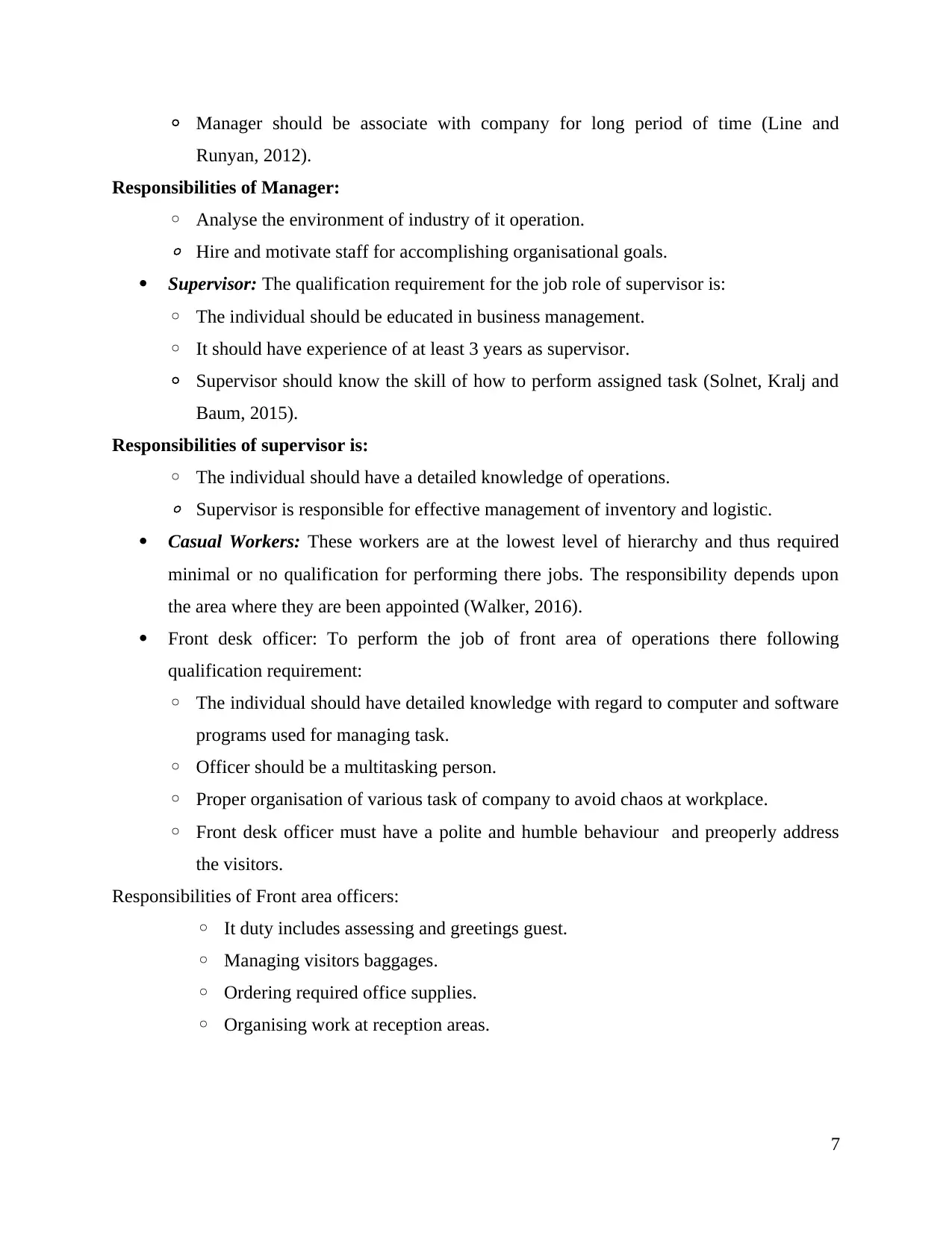
◦ Manager should be associate with company for long period of time (Line and
Runyan, 2012).
Responsibilities of Manager:
◦ Analyse the environment of industry of it operation.
◦ Hire and motivate staff for accomplishing organisational goals.
Supervisor: The qualification requirement for the job role of supervisor is:
◦ The individual should be educated in business management.
◦ It should have experience of at least 3 years as supervisor.
◦ Supervisor should know the skill of how to perform assigned task (Solnet, Kralj and
Baum, 2015).
Responsibilities of supervisor is:
◦ The individual should have a detailed knowledge of operations.
◦ Supervisor is responsible for effective management of inventory and logistic.
Casual Workers: These workers are at the lowest level of hierarchy and thus required
minimal or no qualification for performing there jobs. The responsibility depends upon
the area where they are been appointed (Walker, 2016).
Front desk officer: To perform the job of front area of operations there following
qualification requirement:
◦ The individual should have detailed knowledge with regard to computer and software
programs used for managing task.
◦ Officer should be a multitasking person.
◦ Proper organisation of various task of company to avoid chaos at workplace.
◦ Front desk officer must have a polite and humble behaviour and preoperly address
the visitors.
Responsibilities of Front area officers:
◦ It duty includes assessing and greetings guest.
◦ Managing visitors baggages.
◦ Ordering required office supplies.
◦ Organising work at reception areas.
7
Runyan, 2012).
Responsibilities of Manager:
◦ Analyse the environment of industry of it operation.
◦ Hire and motivate staff for accomplishing organisational goals.
Supervisor: The qualification requirement for the job role of supervisor is:
◦ The individual should be educated in business management.
◦ It should have experience of at least 3 years as supervisor.
◦ Supervisor should know the skill of how to perform assigned task (Solnet, Kralj and
Baum, 2015).
Responsibilities of supervisor is:
◦ The individual should have a detailed knowledge of operations.
◦ Supervisor is responsible for effective management of inventory and logistic.
Casual Workers: These workers are at the lowest level of hierarchy and thus required
minimal or no qualification for performing there jobs. The responsibility depends upon
the area where they are been appointed (Walker, 2016).
Front desk officer: To perform the job of front area of operations there following
qualification requirement:
◦ The individual should have detailed knowledge with regard to computer and software
programs used for managing task.
◦ Officer should be a multitasking person.
◦ Proper organisation of various task of company to avoid chaos at workplace.
◦ Front desk officer must have a polite and humble behaviour and preoperly address
the visitors.
Responsibilities of Front area officers:
◦ It duty includes assessing and greetings guest.
◦ Managing visitors baggages.
◦ Ordering required office supplies.
◦ Organising work at reception areas.
7
Paraphrase This Document
Need a fresh take? Get an instant paraphrase of this document with our AI Paraphraser
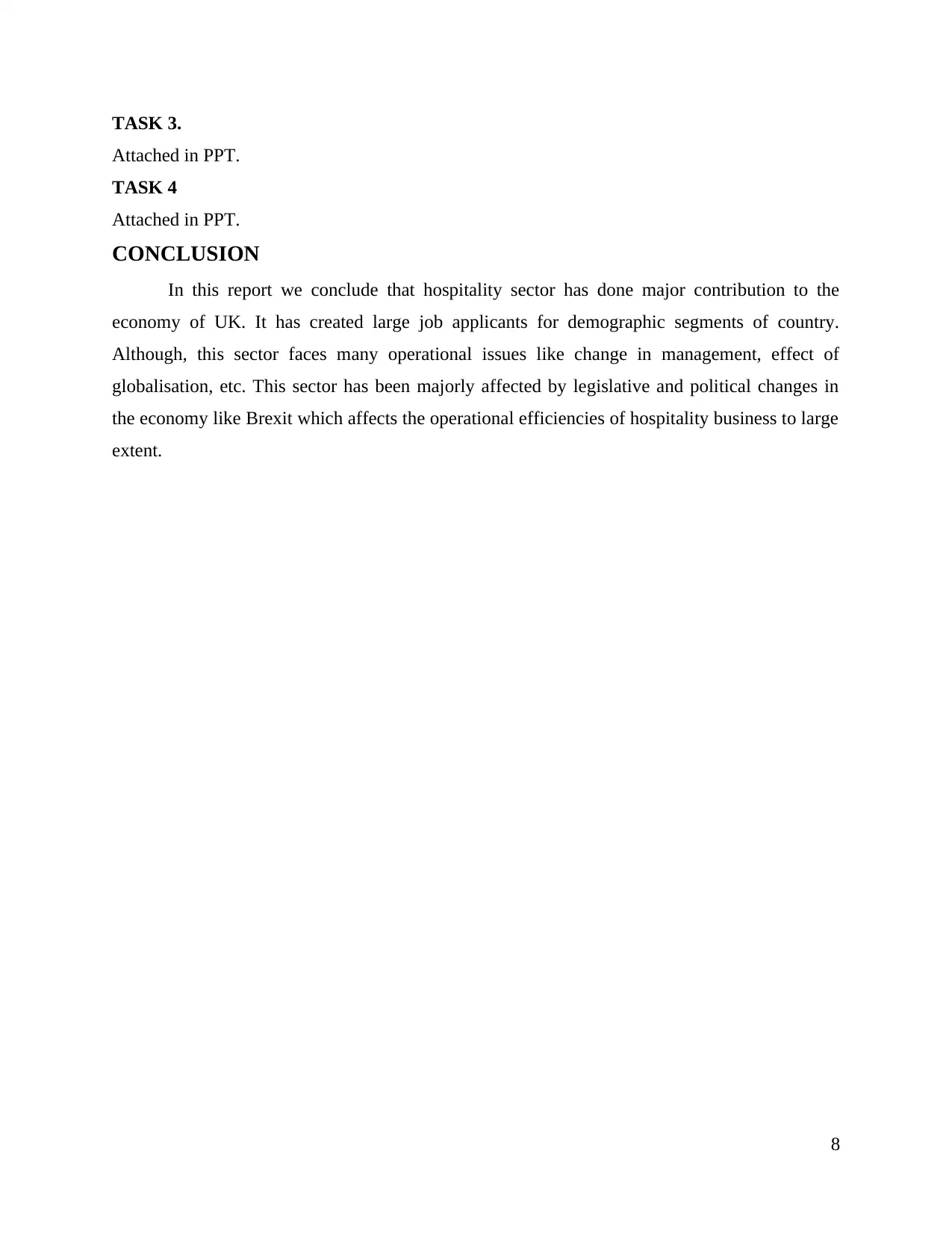
TASK 3.
Attached in PPT.
TASK 4
Attached in PPT.
CONCLUSION
In this report we conclude that hospitality sector has done major contribution to the
economy of UK. It has created large job applicants for demographic segments of country.
Although, this sector faces many operational issues like change in management, effect of
globalisation, etc. This sector has been majorly affected by legislative and political changes in
the economy like Brexit which affects the operational efficiencies of hospitality business to large
extent.
8
Attached in PPT.
TASK 4
Attached in PPT.
CONCLUSION
In this report we conclude that hospitality sector has done major contribution to the
economy of UK. It has created large job applicants for demographic segments of country.
Although, this sector faces many operational issues like change in management, effect of
globalisation, etc. This sector has been majorly affected by legislative and political changes in
the economy like Brexit which affects the operational efficiencies of hospitality business to large
extent.
8
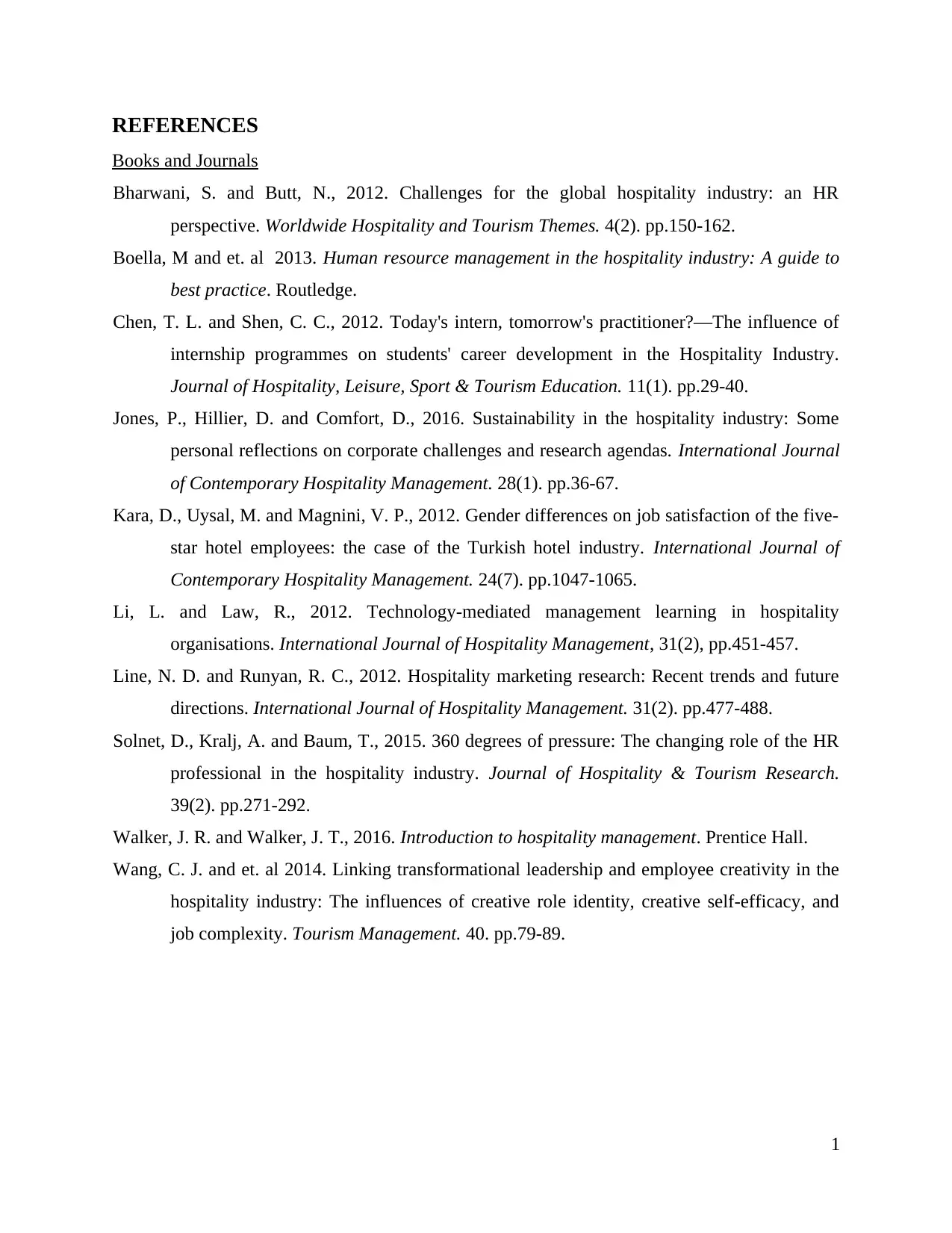
REFERENCES
Books and Journals
Bharwani, S. and Butt, N., 2012. Challenges for the global hospitality industry: an HR
perspective. Worldwide Hospitality and Tourism Themes. 4(2). pp.150-162.
Boella, M and et. al 2013. Human resource management in the hospitality industry: A guide to
best practice. Routledge.
Chen, T. L. and Shen, C. C., 2012. Today's intern, tomorrow's practitioner?—The influence of
internship programmes on students' career development in the Hospitality Industry.
Journal of Hospitality, Leisure, Sport & Tourism Education. 11(1). pp.29-40.
Jones, P., Hillier, D. and Comfort, D., 2016. Sustainability in the hospitality industry: Some
personal reflections on corporate challenges and research agendas. International Journal
of Contemporary Hospitality Management. 28(1). pp.36-67.
Kara, D., Uysal, M. and Magnini, V. P., 2012. Gender differences on job satisfaction of the five-
star hotel employees: the case of the Turkish hotel industry. International Journal of
Contemporary Hospitality Management. 24(7). pp.1047-1065.
Li, L. and Law, R., 2012. Technology-mediated management learning in hospitality
organisations. International Journal of Hospitality Management, 31(2), pp.451-457.
Line, N. D. and Runyan, R. C., 2012. Hospitality marketing research: Recent trends and future
directions. International Journal of Hospitality Management. 31(2). pp.477-488.
Solnet, D., Kralj, A. and Baum, T., 2015. 360 degrees of pressure: The changing role of the HR
professional in the hospitality industry. Journal of Hospitality & Tourism Research.
39(2). pp.271-292.
Walker, J. R. and Walker, J. T., 2016. Introduction to hospitality management. Prentice Hall.
Wang, C. J. and et. al 2014. Linking transformational leadership and employee creativity in the
hospitality industry: The influences of creative role identity, creative self-efficacy, and
job complexity. Tourism Management. 40. pp.79-89.
1
Books and Journals
Bharwani, S. and Butt, N., 2012. Challenges for the global hospitality industry: an HR
perspective. Worldwide Hospitality and Tourism Themes. 4(2). pp.150-162.
Boella, M and et. al 2013. Human resource management in the hospitality industry: A guide to
best practice. Routledge.
Chen, T. L. and Shen, C. C., 2012. Today's intern, tomorrow's practitioner?—The influence of
internship programmes on students' career development in the Hospitality Industry.
Journal of Hospitality, Leisure, Sport & Tourism Education. 11(1). pp.29-40.
Jones, P., Hillier, D. and Comfort, D., 2016. Sustainability in the hospitality industry: Some
personal reflections on corporate challenges and research agendas. International Journal
of Contemporary Hospitality Management. 28(1). pp.36-67.
Kara, D., Uysal, M. and Magnini, V. P., 2012. Gender differences on job satisfaction of the five-
star hotel employees: the case of the Turkish hotel industry. International Journal of
Contemporary Hospitality Management. 24(7). pp.1047-1065.
Li, L. and Law, R., 2012. Technology-mediated management learning in hospitality
organisations. International Journal of Hospitality Management, 31(2), pp.451-457.
Line, N. D. and Runyan, R. C., 2012. Hospitality marketing research: Recent trends and future
directions. International Journal of Hospitality Management. 31(2). pp.477-488.
Solnet, D., Kralj, A. and Baum, T., 2015. 360 degrees of pressure: The changing role of the HR
professional in the hospitality industry. Journal of Hospitality & Tourism Research.
39(2). pp.271-292.
Walker, J. R. and Walker, J. T., 2016. Introduction to hospitality management. Prentice Hall.
Wang, C. J. and et. al 2014. Linking transformational leadership and employee creativity in the
hospitality industry: The influences of creative role identity, creative self-efficacy, and
job complexity. Tourism Management. 40. pp.79-89.
1
⊘ This is a preview!⊘
Do you want full access?
Subscribe today to unlock all pages.

Trusted by 1+ million students worldwide
1 out of 9
Related Documents
Your All-in-One AI-Powered Toolkit for Academic Success.
+13062052269
info@desklib.com
Available 24*7 on WhatsApp / Email
![[object Object]](/_next/static/media/star-bottom.7253800d.svg)
Unlock your academic potential
Copyright © 2020–2026 A2Z Services. All Rights Reserved. Developed and managed by ZUCOL.





